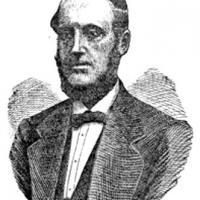
Bird to Bogo
Bird's Opening is named after the 19th century English accountant and chess master Henry Edward Bird (1830-1908), although Bird did not invent the opening, which has been known since the time of Lucena in the 15th century. The first known game beginning with 1. f4 was played by Greco against an unknown opponent in 1620.
In 1866 Bird was one of the strongest players in the world, and battled Wilhelm Steinitz -- who later became the first official world champion -- in a 17-game match in London. Ironically, Bird lost the only game in the match where he played "his" opening, losing 8.5 to 9.5, but only after he had to leave the match prematurely to attend business in the U.S. Had he defeated Steinitz in that Bird's Opening game the match would have ended in a draw.
Bird was known for playing odd openings, hence his love of 1. f4. He was also proficient in the Dragon variation of the Sicilian, which is popular today, though regarded as unusual in Bird's time. There are two other opening variations that honor his name, both of which begin with 1. e4 e5 2. Nf3 Nc6. The Bird Attack is characterized by the continuation: 3. c3 f5 4. d4 d6 5. d5, while the Bird Defense is a line of the Ruy Lopez: 3. Bb5 Nd4.
Bird must have been a pleasant, albeit unkempt, gentleman, having been described as "majestic in stature...with a pleasant smiling countenance", yet "less majestic in the tobacco-ash upon his waistcoat."
Henry Bird was a player in the tradition of those who also wrote about the game. You may read his 1893 text Chess History and Reminiscences on the Project Gutenberg site at http://www.gutenberg.org/etext/4902.
Here is a nice game where Blackburne unsuccessfully tries the From Gambit against Bird playing the Bird in 1879.
The Bogo-Indian Defense draws its name from the Ukrainian-born conundrum that is Efim Bogoljubov, who straddled two centuries from 1889 to 1952. I refer to the handsome Bogoljubov as a conundrum because I do not understand the man after having read about him. My initial impression was that he was a forgiving, and therefore rather kindly man.

At the outbreak of World War I he was playing a tournament in Mannheim when the Germans arrested him and 10 other Russian players. While incarcerated he won 5 of the 8 tournaments among the prisoners, which included no less a master than Alekhine. In spite of his internment, he later emigrated to Germany and obtained German citizenship. He even lived in Triberg, the same town in which the Germans had imprisoned him. In 1931 he represented Germany in the Chess Olympiad in Prague.
I found this information to be of interest, indicating a certain complexity to the man’s personality. I was correct, but not in the manner I was thinking at that time. Hans Kmoch relates an anecdote regarding a 1936 Dutch tournament where Bogoljubov asked the tournament directors why the swastika was not being used as the ‘flag’ marking German players. At the same tournament, he apparently made a tasteless joke to Reuben Fine, obliquely referring to Fine’s Jewish ethnicity and whether he was happy over the recent fate of the Hindenburg, which had burned in New Jersey at the conclusion of its translatlantic flight.
Kmoch tells another story about Bogoljubov bragging that he had played “the game that killed Dr. Tarrasch” when the latter had died shortly after a game with Bogoljubov.
This is not an individual that I particularly admire, although we must always remember that people are indeed complex. Who among us can claim to be saintly? Bogoljubov actually studied theology, in keeping with his name, which means ‘beloved of God.’ Indeed, Kmoch goes on to describe Bogoljubov as a “friendly man” , “very good natured”, and “much more amiable than his compatriot Alekhine”, which is not exactly high praise for either man since Alekhine was known to be rather mean. Still, we must recognize that Bogoljubov had a sense of humor, which is demonstrated by his remark, “When I am White, I win because I am White. When I am Black, I win because I am Bogoljubov.”
Bogoljubov played two world championship matches, losing both to Alekhine.
Here is Bogoljubov defeating Grünfeld with the Bogo-Indian, which begins 1. d4 Nf6 2. c4 e6 3. Nf3 Bb4. Since he is Black in this game, Bogoljubov wins because he is Bogoljubov.
This blog is one of a continuing series that discusses the players whose names grace many openings. Here are the links to these blogs published to date:
The Names behind the Openings, Part 1
Bird to Bogo
Caro, Kann and Chigorin – Openings Players
Evans and Göring: Gambiteers

